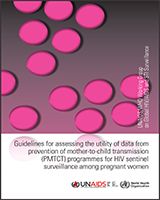Global surveillance of HIV and sexually transmitted infections is a joint effort of the World Health Organization (WHO) and the Joint United Nations Programme on HIV/AIDS (UNAIDS).
This document is based on experience in countries and expert reviews from WHO/UNAIDS and the United States Centers for Disease Control and Prevention (CDC). WHO and UNAIDS would like to thank the individuals who contributed to this document.
The development of this document was coordinated by Jesus M. Garcia Calleja of WHO; Dita Broz, Jacob Dee, Dana Dolan and Abraham Miranda of CDC.
Major technical inputs were provided by Rachel Blacher, Christopher Murrill, Bharat Parekh, Prabhu Vimalanand, Ray W. Shiraishi, Amy Watson and Irum Zaidi of CDC; Kimberly Marsh of the Imperial College of London; Bethany Hedt of the Harvard Medical School.
Additional technical inputs and review were provided by Dick Chamla, Chika Hayashi, Pascal Milenge, Etienne Mpoyi Mutombo, Lori Newman, Spes Ntabangana, Paul Pana, Nathan Shaffer and Yves Souteyrand of WHO; Tobias Alfven, Paloma Cuchi, Peter Ghys, Mary Mahy and Karen Stanecki of UNAIDS; Omotayo Bolu, Anindya De, Wolfgang Hladik, Andrea Kim, A.D. McNaghten, Drew Voetsch and Peter Young of CDC; Timothy Fowler and Festus A. Ukwuani of the U.S. Census Bureau; Hanh La of the United States Agency for International Development (USAID); Roberta Horth of the University of California at San Francisco; Mohammed Dahoma of the Zanzibar AIDS Control Programme; Tebogo Phillip Madidimalo of the Botswana Department of HIV/AIDS Prevention and Care; Mussagy Mahomed of the Mozambique National Institute of Health; Davies Kimanga of the Kenya National AIDS and STI Control Programme; Rajesh Kumar of the Post Graduate Institute of Medical Education and Research School of Public Health, India.
Funding to support this work was provided by the United States President's Emergency Plan for AIDS Relief (PEPFAR), UNAIDS and WHO.

